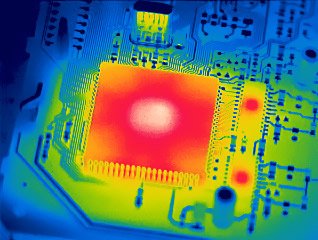Switching DC/DC voltage converters are popular because they provide efficient power conversion that can exceed 90 percent. That is an advantage both when input power is at a premium and when it is difficult to get the heat out (common challenges for engineers designing compact portable products).
With key power component manufacturers offering products that appear virtually identical on the specification sheet, it is tempting for an engineer to just pick a switching converter with the highest peak efficiency from a shortlist that meets their product’s general requirements. However, that would be a mistake because apparently identical converters can offer markedly different performance.
This article considers the major implications for power dissipation and associated heat rise that just a few percentage points difference in efficiency can make. The article then leads on to discuss how, depending on the load pattern, a converter with lower peak efficiency, but a flatter efficiency curve, could well be the better choice for a particular application.
For more detail:Selecting the Right Voltage Converter Is Not Just About Peak Efficiency

